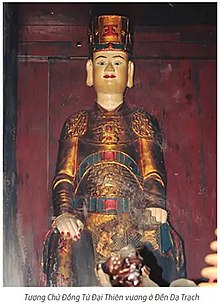Chử Đồng Tử

Chử Đồng Tử (Chữ Hán: 褚童子) is the name of a famous Vietnamese divine being, one of "The Four Immortals" "Tứ bất tử" in traditional Vietnamese mythology.[1] In legend Chử Đồng Tử appeared on a yellow or golden dragon to Triệu Quang Phục the sixth-century resistance leader.[2]
Mythology
[edit]Chử was born in an extremely poor fishing family. He and his father possessed nothing but a single loincloth. When his father died, Chử Đồng Tử did not want to bury his father while naked. Afraid of being seen bare by others, Chử retreated to a marsh where few people would approach.
One day, Princess Tiên Dung (仙容) passed by the marsh. She ordered her servant to put up curtains while she took a bath. Coincidentally, the spot she chose to bathe in was exactly where Chử was hiding himself. Upon discovering the youth, the Princess reckoned that this meeting must be fate, and proposed to Chử.
The king was enraged by his daughter's marriage to a poor commoner. He disowned Princess Tiên Dung and her husband. They were forced to wander and work to feed themselves. Chử Đồng Tử took up trading as his occupation. Whilst on a caravan or business trip, he docked at an island on the sea where he met a sage named Phật Quang (佛光). Chử remained behind to become his disciple. Upon completing his study, his master gave him a stick and a hat.
Upon returning to his wife and wandering lifestyle, one day the couple found themselves in a vast field with no shelter under the pouring hail. Chử drove the stick into the ground and used the hat to shield his wife. To their amazement, the stick and the hat transformed into a grand palace with many servants. People from nearby villages came and pledged their allegiance to the princess and her husband.
Assuming that his daughter was rebelling against him, the king led a force to subjugate her. The princess and her husband refused to fight him, so with their castle and servants, they ascended into heaven. The spot where the castle once stood is now called Nhất Dạ (meaning One Night).
References
[edit]- ^ Dana Sachs Two Cakes Fit for a King: Folktales from Vietnam Page 9 2003 " a pantheon of four immortal Gods: Son Tinh, the god of Tan Vien Mountain; Saint Giong, the infant general of Phu Dong village; Chu Dao Tu (also known as Chu Dong Tu); and, the Mother Fairy, Lieu Hanh."
- ^ Keith Weller Taylor The Birth of Vietnam - Page 152 1991"According to tradition, Quang Phuc raised an altar in the marsh, lit incense, and prayed to the spirits; his faith was answered by the appearance of Chu Dong Tu descending from heaven astride a yellow dragon. The immortal said to Quang Phuc: "Although I long ago ascended into heaven, spiritual power still remains in this place; since you have prayed with sincerity, ."
